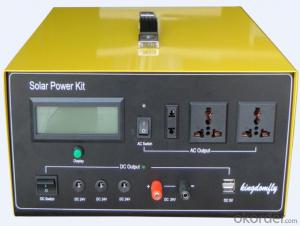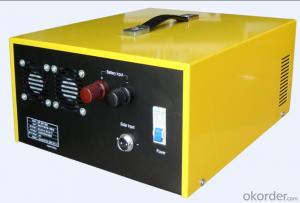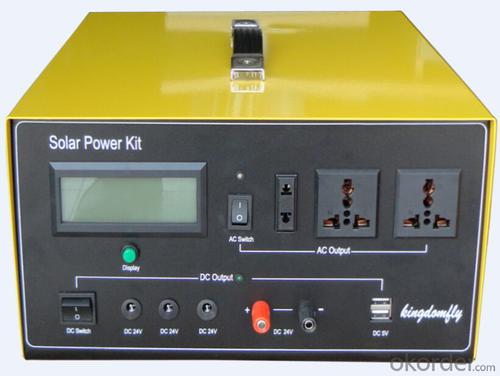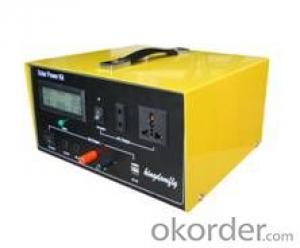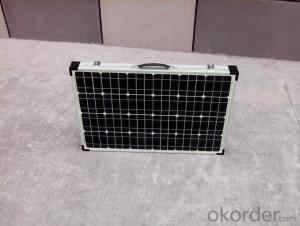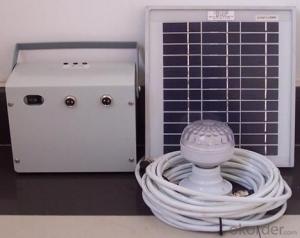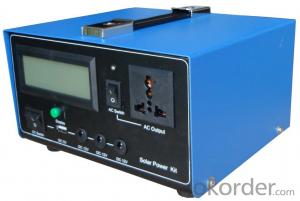Solar Energy Systems Indiana - Home Solar Power System SPK_1000
- Loading Port:
- China main port
- Payment Terms:
- TT OR LC
- Min Order Qty:
- 3 pc
- Supply Capability:
- 10000 pc/month
OKorder Service Pledge
OKorder Financial Service
You Might Also Like
Main Information
KDF SPK_1000 This product is high performance,family used portable solar power system,which can receive energy and store it in battery outside connected to SPK by solar energy on sunny day,and supplies electric power for varies appliances such as electric fan,lighting lamps, television, portable computer etc.It can supply power for both DC and AC electric application .It’s very helpful and useful for home electric supply.
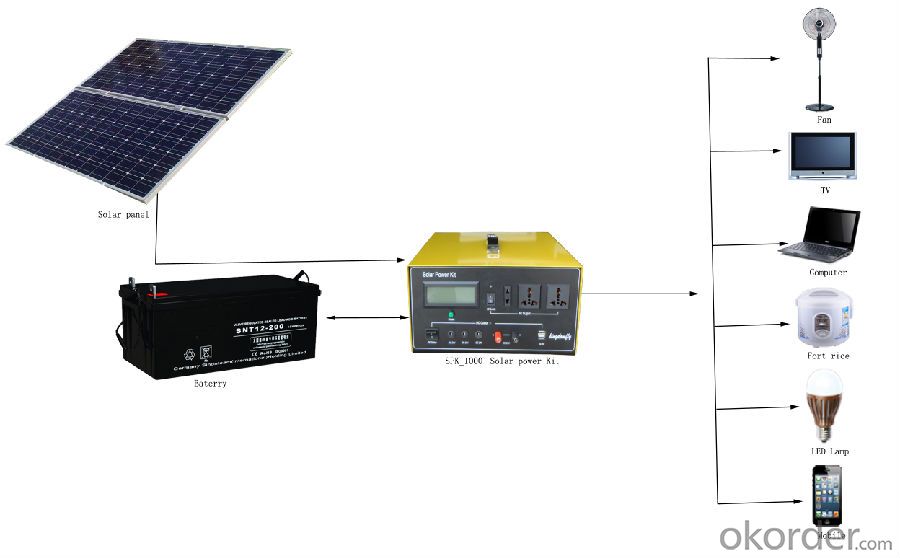
Features:
◆ Battery puts outside connected to the SPK for user to choose battery in recommended range, and easily to exchange battery.
◆ Both DC and AC output
◆ Solar Feedback Circuit Protection
◆ Output Short-circuit Protection
◆ Solar「+」「-」anti-access protection
◆ Output「+」「-」anti-access protection
◆ Over Charged Protection
◆ Over Discharged Protection
◆ Over Load Protection
◆ Over-Temperature Protection
Technical parameters
Specification | Value/Material | |
Item No. KDF | SPK_1000 | |
Solar Recommended | Specification | Poly silicon |
Working Voltage/Power | 36V/80W~500W | |
Battery Recommended | Rated Voltage/Capacity | 24V50AH~200AH |
Cycle Number | 80% Deep Cycle Number:500 70% Cycle Number:800 | |
Working Temperature | Short Period(one Month):-20~50℃Long Period(Six Months):-10~45℃ | |
Charging Controller | Operating Voltage | 24V |
Input Voltage | 34.6V~42V | |
Input current | MAX:20A | |
Power Consumption | MAX: 15mA | |
Low Voltage Disconnect(LVD) | 21.6V | |
Low Voltage Reconnect(LVR) | 24.6V | |
High Voltage Discharge( HVC) | 29.2V | |
High Voltage Recharge(HVR) | 27.6V | |
Temperature Protection | 60℃ | |
DC Output | DC output & Application | USB 5V2A |
DC output & Application | DC 24V | |
AC Output | Output Wave | Modified sine wave |
Input Voltage | 22V~30V | |
Output Voltage | 220V±10% | |
Output Frequency | 60Hz±2Hz/50Hz±2Hz | |
Rated Output Power | 1000W | |
Maximum VA | 2000VA | |
Maximum Efficiency | 88% | |
Temperature | 0-40℃ | |
Over Temperature | 60℃~70℃ | |
Low Voltage Alarm | 22V | |
Low Voltage Shut off | 21V | |
High Voltage Shut off | 30V | |
Package | Set size | 350*449*227mm |
Set N·W | 7.2kg | |
Set N·W | 5.2kg | |
LCD_Display
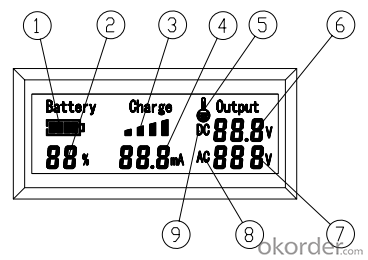
No. | Name | Function |
1 | Battery Icon | To show the Volume of the Battery |
2 | Date of % | To show the percent of the Battery |
3 | Charging Icon | To show the charging condition |
4 | Current | To show the value of charge current |
5 | Temperature Icon | Temperature Alarm |
6 | Date of Voltage | To Show the Value of DC output voltage |
7 | Date of Voltage | To Show the Value of AC output voltage |
8 | AC Icon | AC output |
9 | DC Icon | DC output |
- Q: Can solar energy systems be used in areas with high levels of air pollution from wildfires?
- Despite high levels of air pollution from wildfires, solar energy systems can still be utilized. Though the efficiency of solar panels may be diminished due to reduced sunlight and energy generation, they are not rendered completely useless. Even in partially shaded conditions, solar panels are capable of producing electricity, albeit with a lower output. Moreover, advancements in solar panel technology have enhanced their resilience to various environmental factors such as smoke and dust particles. Furthermore, solar energy systems can serve as a valuable source of electricity during and after wildfires when power outages are prevalent. Therefore, despite the impact of air pollution from wildfires on their performance, solar energy systems can still be effectively employed in these areas.
- Q: What is the maintenance schedule for a solar energy system?
- The maintenance schedule for a solar energy system typically involves regular cleaning of the panels, checking for any damage or debris, and inspecting the system's overall performance at least once a year. Additionally, it is important to monitor and maintain the batteries, inverters, and other components as needed.
- Q: What is the difference between a solar energy system and a solar thermal system?
- Solar energy systems and solar thermal systems both harness energy from the sun, but they differ in their methods of conversion and utilization. A solar energy system, which is also known as a photovoltaic (PV) system, utilizes solar panels composed of photovoltaic cells to directly convert sunlight into electricity. These panels contain semiconductor materials that generate an electric current when exposed to sunlight. The electricity produced by the PV system can be used to power various electrical devices, including lights, appliances, and even entire houses or buildings. It can also be stored in batteries for future use or fed back into the grid. On the other hand, a solar thermal system primarily focuses on utilizing the sun's energy to heat water or air. This system typically consists of solar collectors that absorb sunlight and convert it into heat energy. The accumulated heat is then transferred to a fluid, usually water or anti-freeze, that circulates throughout the system. In a water-based solar thermal system, the heated fluid can be directly used for domestic hot water or space heating purposes. In contrast, an air-based solar thermal system uses the heated air to warm indoor spaces. To summarize, the primary distinction between a solar energy system and a solar thermal system lies in their methods of converting and utilizing solar energy. A solar energy system directly converts sunlight into electricity, while a solar thermal system converts sunlight into heat energy for heating water or air.
- Q: What is the warranty period for solar energy systems?
- The warranty period for solar energy systems can vary depending on the manufacturer and components of the system. Generally, solar panels come with a warranty period of 25 years, which guarantees that the panels will perform at a certain level for that duration. Inverter warranties, on the other hand, typically range from 5 to 15 years. It's important to note that the warranty period may differ between the product itself and the installation work, so it's crucial to thoroughly review the warranty terms and conditions provided by the manufacturer and installer. Ultimately, the warranty period for solar energy systems is essential in ensuring the longevity and reliability of the system, providing peace of mind to the consumer.
- Q: Can a solar energy system be used to power outdoor lighting?
- Yes, a solar energy system can be used to power outdoor lighting. Solar panels collect and convert sunlight into electricity, which can be stored in batteries and used to power outdoor lights during the night. This offers an environmentally-friendly and cost-effective solution for outdoor lighting.
- Q: Can solar energy systems be used for powering off-grid agricultural processing facilities?
- Yes, solar energy systems can be used for powering off-grid agricultural processing facilities. Solar panels can be installed on the roofs of these facilities or in nearby open spaces to capture sunlight and convert it into electricity. This renewable energy source can provide a consistent and reliable power supply for various agricultural processing operations, such as irrigation systems, grain milling, food drying, and cold storage. Additionally, solar energy systems can be combined with battery storage to ensure uninterrupted power supply even during cloudy days or at night. This can significantly reduce reliance on fossil fuels, lower operating costs, and promote sustainable agricultural practices.
- Q: What is the role of solar-powered ventilation systems in solar energy systems?
- The role of solar-powered ventilation systems in solar energy systems is to improve the overall efficiency and performance of the system. These ventilation systems help in regulating the temperature and air quality within the solar energy system, preventing overheating and reducing the need for additional cooling mechanisms. By utilizing the power of the sun, these ventilation systems provide sustainable and environmentally friendly solutions for maintaining optimal conditions in solar energy systems.
- Q: Can a solar energy system be financed through a loan?
- Yes, a solar energy system can be financed through a loan. Many financial institutions and government programs offer loans specifically for solar panel installation. These loans allow homeowners and businesses to spread out the cost of the solar system over a period of time while still reaping the benefits of renewable energy.
- Q: Can solar energy systems be installed on roofs?
- Yes, solar energy systems can be installed on roofs. In fact, rooftops are one of the most common locations for solar panel installations, as they offer ample space and direct access to sunlight. This allows for efficient harnessing of solar energy to generate electricity or heat water.
- Q: Can a solar energy system be installed on a public park or recreational area?
- Yes, a solar energy system can be installed on a public park or recreational area. Many public parks and recreational areas have ample space and access to sunlight, making them ideal locations for solar panel installations. These systems can help generate clean and renewable energy, reducing the carbon footprint of the park and providing electricity for various facilities and amenities within the area. However, it is important to consider any potential impacts on the park's aesthetics, functionality, and public use during the installation process.
Send your message to us
Solar Energy Systems Indiana - Home Solar Power System SPK_1000
- Loading Port:
- China main port
- Payment Terms:
- TT OR LC
- Min Order Qty:
- 3 pc
- Supply Capability:
- 10000 pc/month
OKorder Service Pledge
OKorder Financial Service
Similar products
Hot products
Hot Searches
Related keywords
